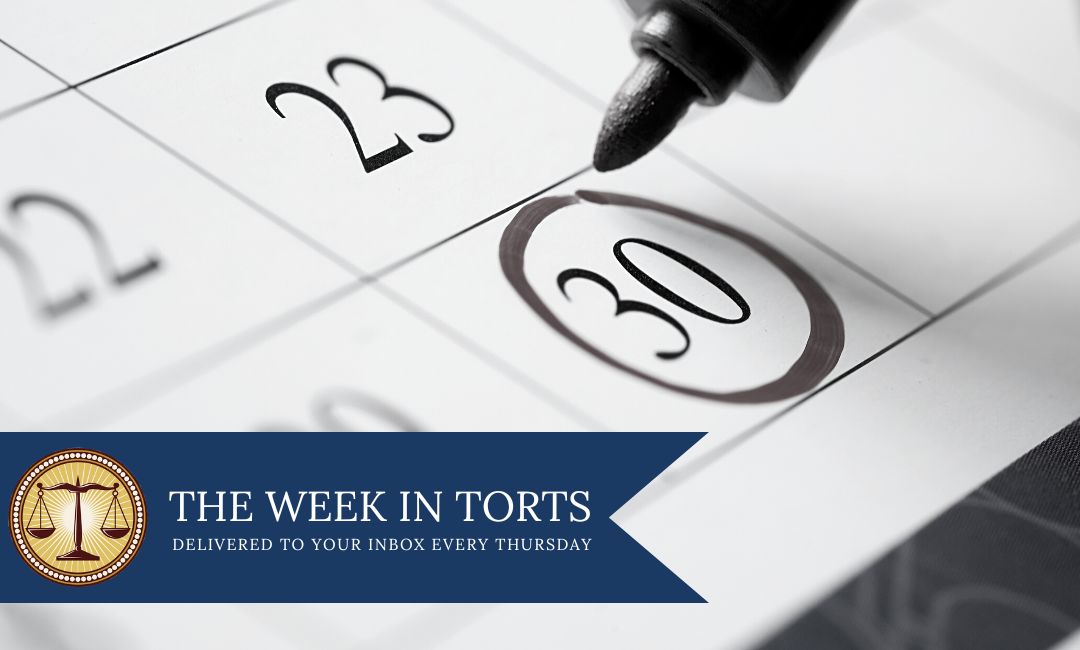The Week In Torts – Cases from December 9, 2022

We need an Answer.
FLORIDA LAW WEEKLY
VOLUME 47, NUMBER 49
CASES FROM THE WEEK DECEMBER 9, 2022
A MOTION TO DISMISS IS NOT A RESPONSIVE PLEADING
McClash v. Urschel, 47 Fla. L. Weekly D2478 (Fla. 2nd DCA Nov. 30, 2022):
In a case where there was a dispute over whether the four-corners of the Complaint revealed that the statute of limitations had run, the plaintiff sought to amend his complaint after the defendant moved to dismiss. The trial court refused to allow the amendment.
Pursuant to Rule 1.190(1), a party may amend a pleading once as a matter of course, at any time before a responsive pleading is served.
A motion to dismiss is not a “responsive pleading,” because it is not a “pleading” under the rules. Thus, because the defendants had not actually served their answer, and had only filed a motion to dismiss, the trial court abused its discretion in refusing to allow the plaintiff to amend his complaint.
NO IRREPARABLE HARM IN REFUSING TO ALLOW A SECOND DEPOSITION OF EVEN AN ALLEDEGLY “MATERIAL” WITNESS
Assurance Group of America v. Security Premium Finance, 47 Fla. L. Weekly D2494 (Fla. 3rd DCA Nov. 30, 2022):
The plaintiff sought to take a second deposition of defendant’s corporate representative, arguing that the corporate representative was a material witness, and plaintiff would suffer irreparable harm, if the court prevented it from taking the second deposition. Plaintiff identified eight areas of inquiry that were different from the original areas, in its deposition notice.
While there is nothing in the Rules of Civil Procedure that forbids a second discovery deposition, Rule 1.280(c) does allow a trial court, for good cause, to protect a party from discovery that would cause annoyance, embarrassment, oppression, or undue burden or expense.
In circumstances involving the denial of the right to take testimony of an alleged material witness, courts have recognized that such denials cannot be remedied on appeal, since there is no practical way to determine after judgment what the testimony would be or how it would affect the result.
However, this was a case that concerned a second deposition of a material witness, rendering it distinguishable. The court denied the petition for writ.
COURT REVERSES JUDGMENT ON THE PLEADINGS ENTERED IN MEDICAL MALPRACTICE CASE BECAUSE ISSUES OF FACT EXISTED REGARDING THE PATIENT’S INFORMED CONSENT
Yentes v. Papadopoulos, 47 Fla. L. Weekly D2543 (Fla. 2nd DCA Dec. 2, 2022):
The parties had narrowed the plaintiffs’ claims in this medical malpractice case arising out of complications from a robotic prostatectomy, to a single count for negligence in obtaining the patient’s informed consent.
The plaintiff attached to the complaint an affidavit from a board certified urologist stating that the physician had not informed the plaintiff of all of the risks involved in the operation, including that the physician had never performed the procedure before, or had only done so on a limited basis, and failed to advise that there would be proctor attending the surgery. The affidavit also stated that had the physician adhered to the standard of care in advising the plaintiff of these facts, he would not have chosen to undergo this type of surgery.
The trial court granted the motion for judgment on the pleadings. It found that under Florida’s informed consent law, there is no explicit duty owed by a doctor to disclose prior experience with a specific procedure.
Florida’s medical consent law provides statutory immunity from liability as to certain medical professionals who operate on a patient under certain circumstances, including when the physician obtains the patient’s consent in accordance with the acceptable standard of medical practice among members of the medical profession with similar training and experience.
In this case, the trial court erred in granting the motion for judgment on the pleadings. A review of those pleadings revealed blatant questions of fact: specifically whether expert testimony would establish that the physician had failed to disclose pertinent information when obtaining the informed consent, and whether a reasonable patient would have forgone the surgery if the doctor had disclosed that he had never performed the surgery robotically without being supervised. Therefore, it was error for the trial court to grant judgment on the pleadings.
The court made clear that its opinion was not a comment on the merits of either the plaintiffs’ claims or the defendant’s defenses. The court wanted to be clear that it was not creating a “new duty” that required a physician to disclose the number of times he or she had performed this specific procedure in order to obtain a conformed consent, but rather was finding that the matter could not be resolved as the trial court had resolved it.
ORDER DENYING MOTION FOR SANCTIONS PURSUANT TO § 57.105 IS REVERSABLE WHERE THE TRIAL COURT FAILS TO MAKE ANY FACTUAL FINDINGS – WHILE THE STATUTE DOES NOT DICTATE THAT A COURT MAKE SPECIFIC FINDINGS IN DENYING SUCH A MOTION, THE FAILURE TO DO SO UNDERMINES MEANINGFUL APPELLATE REVIEW
Van Sant Law, LLC v. Air Isaac, LLC, 47 Fla. L. Weekly D2560 (Fla. 2nd DCA Dec. 2, 2022):
Although the law requires the trial court to make findings of frivolity as a prerequisite to awarding fees under section 57.105, the statute does not compel findings to the contrary, and are not necessary before a trial judge denies a motion for such fees.
However, without any findings, it is impossible for the appellate court to determine on review whether the trial court abused its discretion in denying the motion. The court cannot supply the missing reasoning that the trial court did not provide.
The court reversed and remanded to allow the trial court to make findings (either oral or written) to explain why it denied the movant’s motion for sanctions under § 57.105.

